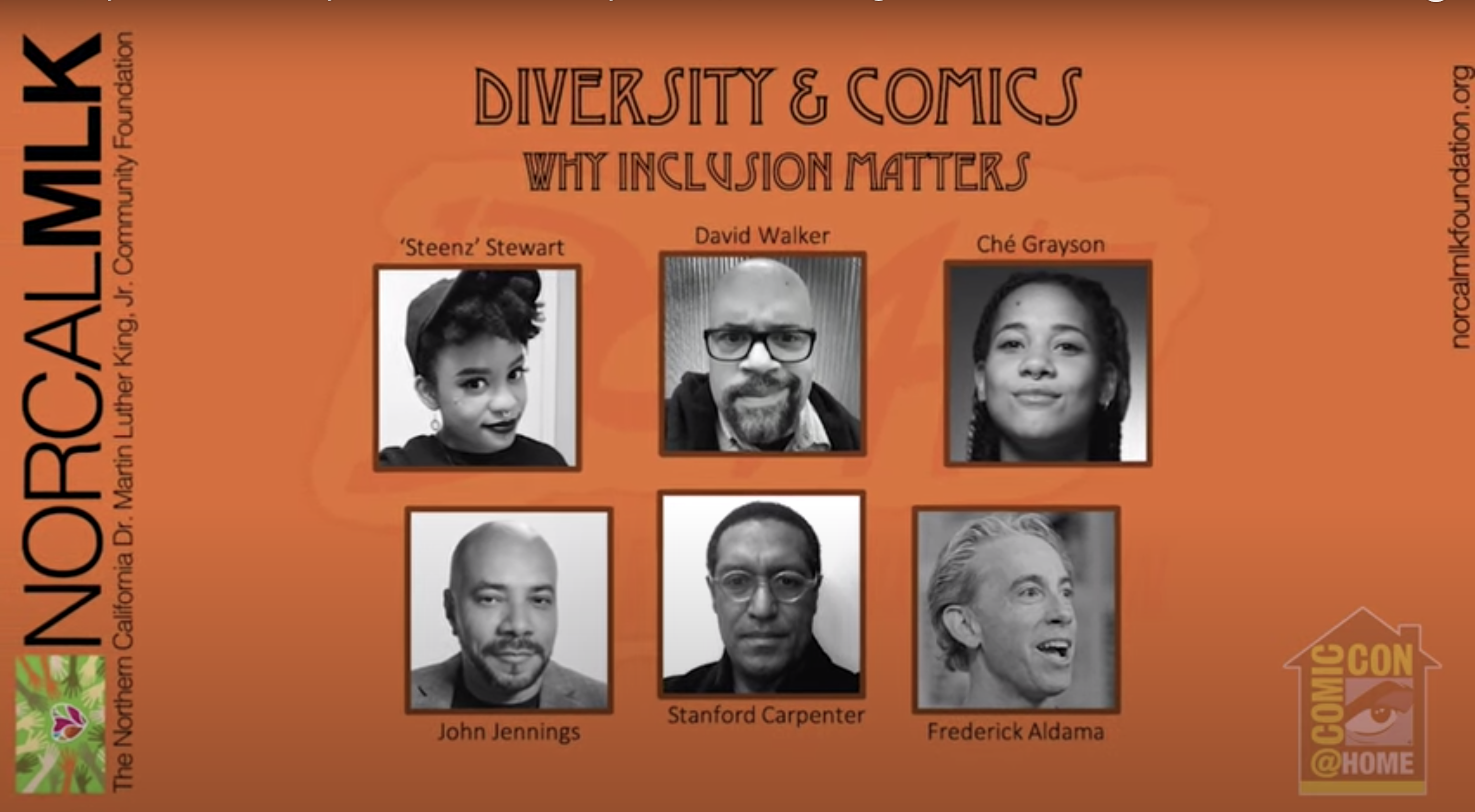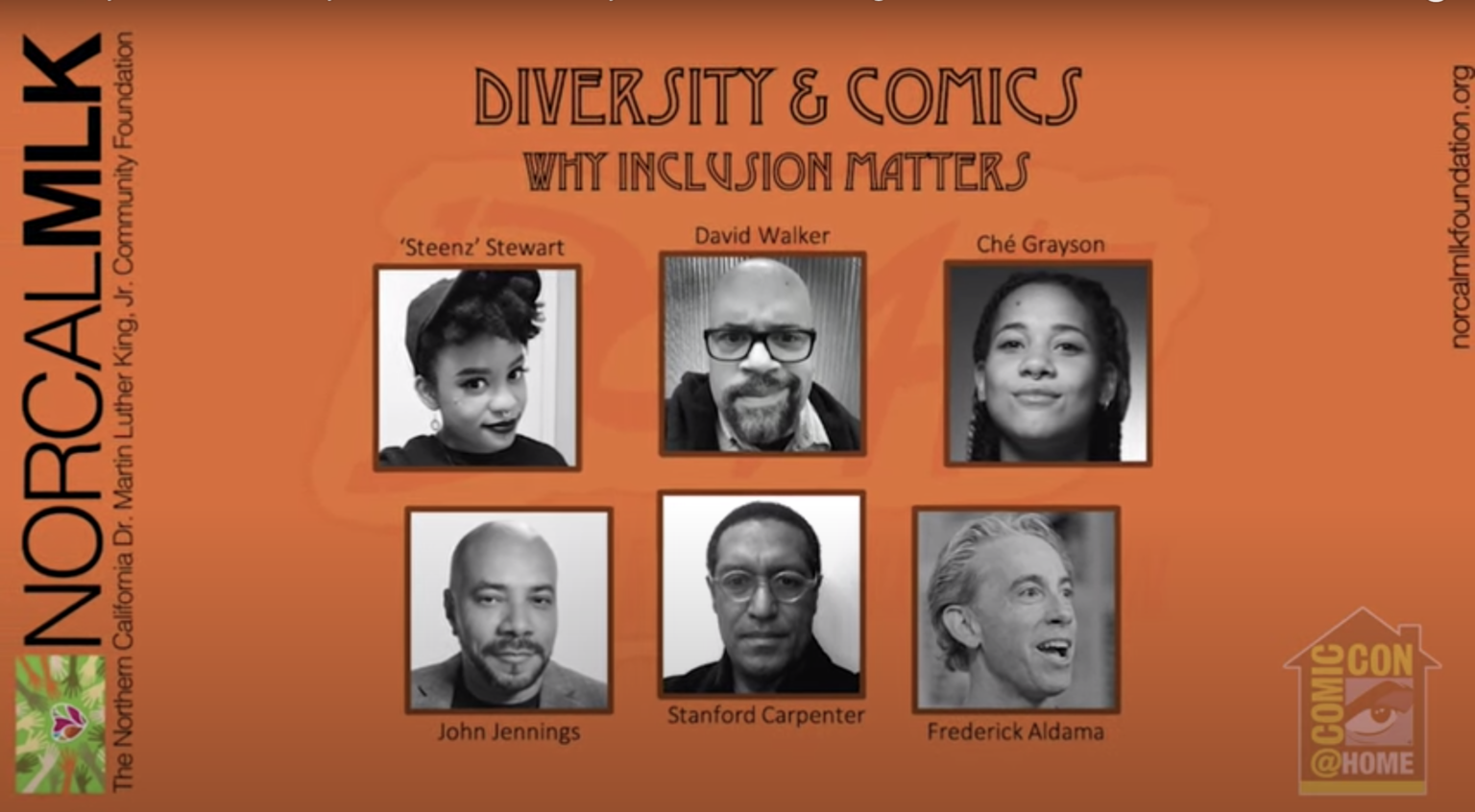
Media companies are now speaking more about aiming for diversity and inclusion in their projects, but how is that happening in practice? This was one of the topics of discussion at the “Diversity & Comics” panel at Comic-Con @ Home, which had predominantly Black creators, and was moderated by Smithsonian alum and Chairman of the Board of Directors for the Institute for Comics Studies, Stanford Carpenter. Panelists included Eisner Award Winners John Jennings and Frederick Aldama (AKA “Professor Latinx”), 2019 Dwayne McDuffie awardee Christina “Steenz” Stuart, animated filmmaker Ché Grayson, and Eisner-nominee David Walker.
When discussing projects they’re working on right now they’re most passionate about, Steenz said she’s “working on a ‘how to buy a house in three parts mini-comic.” Interestingly she said, “there’s so much you don’t know when you’re buying a home! Especially when you’re working in comics and not everything is coming in money wise. This is to give people an idea of how to get it done.”
David Walker mentioned that he’s working on a project on the Black Panther Party, “which is more relevant than ever right now,” he said. He noted that he and his colleagues had to rely on each other for therapeutic help due to the current socio-political landscape, because of “how much we live with it.” He also mentioned that he’s thinking of moving more into non-fiction overall. “I’m doing [that] because that’s where I see my career going—I want to do something relevant but not soul-crushing. The thing that someone can read in a couple of minutes, we live with it for months, sometime years. But I’m also trying to find a way to make non-fiction comics more commonplace.”
Ché spoke on how fortunate she was to land a gig during the current pandemic.“I graduated a year ago, and now I’m in a spot where I’ve gone to film school and wrote a pilot that was supposed to come out at Tribeca, but that was canceled due to COVID which was a hard hit. However, I was, fortunately, able to do some events virtually, and now I have a manager where I don’t only have my own pitches, but I got a co-writing job for an animated tv show off Twitter (I can’t say yet, but it is a popular graphic novel and it is a popular show!) I’m really excited to get paid to write for tv!”
Professor Latinx noted that there is now more of a palpable interest in companies increasing their diversity. “I’m excited about race and coming of age comics,” he said, “There seems to be interested in making comics from a white space and taking it into a brown and Black space, like on Netflix. It’s not only the CW anymore.”
John Jennings was also very busy with upcoming projects. “I’m just finishing up the first megascope book that David Bram and I are doing, but got pushed back to February due to the pandemic. I’m also working on 13 other books! The creative process has been so necessary to be online because of what’s going on, and I’ve been collaborating on WhatsApp and Facebook. I’m also working on a prose short story right now that set in my cyber trap space, which is Black southern cyberpunk.”
David expressed gratitude for hearing his colleagues’ successes and improving diversity in the media landscape.“I’m grateful for all of y’all. I needed this morning to hear all the ideas that are going on. It’s easy to get caught up in this trap thinking that you’re the only one caring about this stuff, and it’s good to know that there are other people out there doing things.”
Steenz also relayed that gratitude, but also noted how tiring it often felt to carry the burden of improving diversity in the entertainment landscape as a person of color. “I was having a conversation that it always feels like it’s on *us* to make the change. When you have that sense of responsibility on your shoulders with being a person of color, and with everything that’s going on, it feels like a lot. When you realize you’re not the only one, the responsibility of feeling like you’re the one that HAS to change it isn’t just on you.”
Professor Latinx concurred with Steenz, and noted how different Europe was from the US in how they support creators. “My dream is to have something like they have in Europe, where they have institutions to support creators, period. You do your thing and you get a salary! It bugs me that we have to go to Kickstarter when there are so much power and money in this country!” Ché added on this point, noting that in Europe, “They have actual institutions where films are made and everything [else] is made through that, and the US is the only major country that doesn’t do that.”
Standford Carpenter elaborated further on this, noting that his workspace at the Smithsonian offered one of the closest things to a “Ministry of Culture” for the US. “It’s interesting, what you’re touching on made me think of my orientation as a Smithsonian fellow, and I had a conversation with one of my mentors, John Franklin, and he said the thing you need to understand about the Smithsonian and where this fits, is that America is one of the only countries without a ministry of culture. The size of the Smithsonian with its governmental and non-governmental component essentially fills that role, but it still isn’t a robust ministry for the culture. The Endowment for the Arts didn’t do that either. What does that mean for something like diversity, and giving space and power for people that don’t have the structural advantage? How do we make space for the culture we represent?”
Ché noted that so much of this disparity was rooted in how artists are simply not considered essential workers. “I saw a graphic of essential vs. non-essential workers, and artists were deemed non-essential, and someone tweeted “’took an artist to make this graphic for you,’ so how is art not essential? America is in a state right now of unlearning and deleting what you’ve found is untrue when you realize it’s untrue, and for art that’s making money which is untrue for its success—art is not sustainable, and everything I’ve done has been through loans or Kickstarter (if I’ve been lucky)”
She also noted that systemic change can branch out from the comics industry, including the recent #MeToo reckoning in comics which has recently branched out more recently to figures in the film industry. “If we can start with comics, then maybe it can be a broader conversation. If we can say, we are comics creators and this is where we attack this issue, then it’s very possible it can branch out into the other arts.”
When the creators noted how the Black Lives Matter movement has pushed the cal for diversity, David noted that the unprecedented attention to the movement was because there are “No distractions (like sports or comics).” Ché recalled how she was part of the movement years back, and how odd it was to see white allies who were previous skeptical of the lethal inequities. “I went to Ferguson when I was in film school, and took the bus with people who are huge now to the moment. That experience was alienating for me when I had to integrate back into mainstream society—it was so powerful and necessary, and then I went back to film school and people said I was “militant” for simply caring about my life.” Now the same white people understand the movement differently and understand my anger after we had abandoned trying to change those minds, and I think they understand because of the pandemic and the lack of distraction. We’ve been dying this whole time, and now people are waking up.
David noted that any company responding to the movement with increasing diversity at their companies need to truly walk the walk. “Any time when there’s been an uprising, you always saw a sign in businesses saying they’re “Black friendly”; some are sincere and some aren’t. How do we work with these creators? I just got an offer from someone, and where is this call coming from? Is this because you expect me as a creator or because I’m your friendly Black man?”
He also made a point that he’s going to continue to stick up for himself at comic companies, and wouldn’t settle for anything less than his worth. “I’m so tired and so worn out of trying to get that work that I know I’m qualified for and I was having a conversation with Christopher Priest, where I’ve realized I’m not only dealing with racism but also ageism. I’m to the point where I’m just going to do it myself. It’s not just my age that keeps me from getting work, it’s all that attitude of when an editor says ‘why don’t you just create a new supervillain for Batman to fight” “It’s now ‘No, why don’t you give me one of the ones you already own as opposed to me doing something new for you.’”
You can watch the whole panel here.
Quotes have been edited for length and clarity





